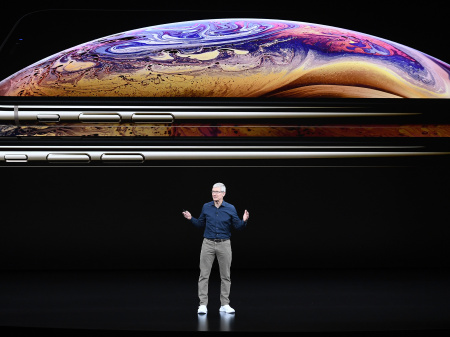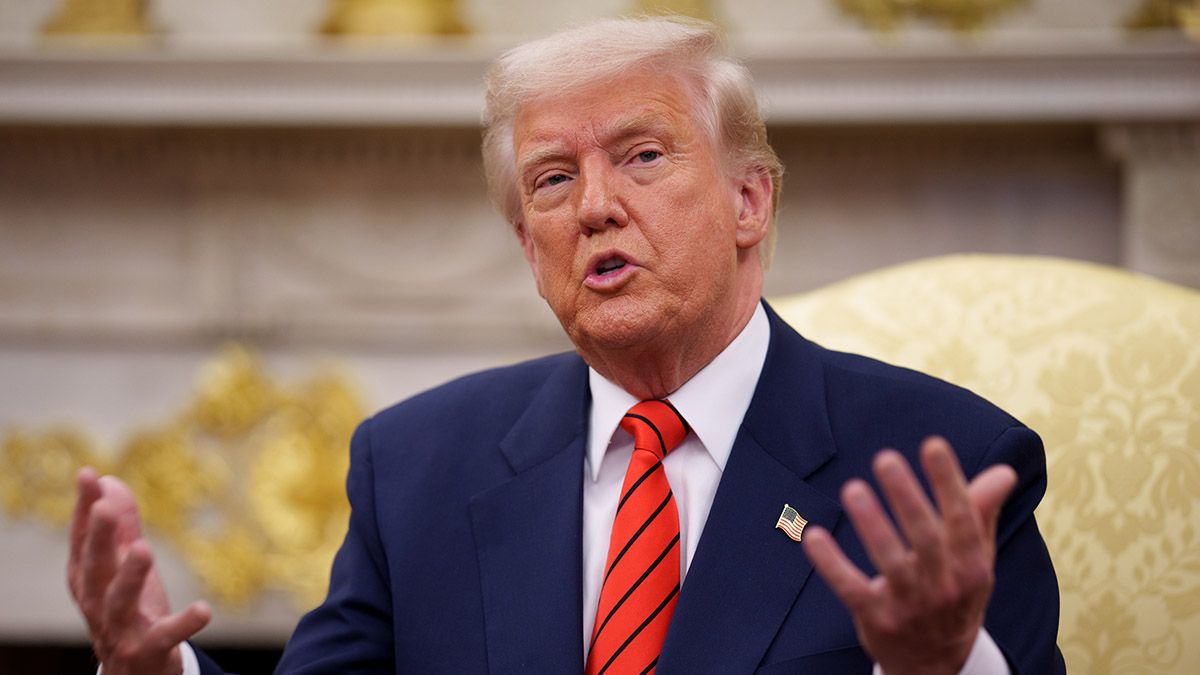The recording supposedly depicted Trump saying of Washington, D.C., “From now on, it will be Washington, D.A., District of America.”
Related Posts

Hundreds Of Companies Call For U.S. To Slash Carbon Emissions
Tim Cook, chief executive officer of Apple Inc., speaks during an event in 2018. Apple is one of 310 companies calling on the Biden administration to slash carbon emissions.; Credit: David Paul Morris/Bloomberg via Getty Images Eric McDaniel | NPR More than 300 businesses have signed an open letter calling on the Biden administration to reduce greenhouse gas emissions in the United States to at least half of 2005 levels by 2030. That would nearly double a previous target set by former President Barack Obama in 2015, who pledged a 25 to 28% reduction by 2025. The United States is not currently on track to meet either goal. The signatories include some of largest companies in the United States, including Walmart, Apple, McDonald’s and Starbucks. “A bold 2030 target is needed to catalyze a zero-emissions future, spur a robust economic recovery, create millions of well-paying jobs, and allow the U.S. to ‘build back better’ from the pandemic,” the letter said, echoing the president’s economic recovery slogan. A 50% reduction target would put the Biden administration in line with what groups such as the United Nations and National Academies of Science say is necessary to mitigate the worst impacts of climate change. In a March statement calling for the same reductions target, the environmental advocacy group Natural Resources Defense Council said such a plan would “help pull the country out of the pandemic-induced recession by putting millions of Americans to work” and inspire more ambitious international climate action ahead of a major United Nations climate conference this November. Like President Joe Biden’s campaign promise to guide the United States to carbon-neutrality by the middle of the century, a 50% emissions reduction target would require steeper emissions cuts than the country has ever achieved. In 2019, greenhouse gas emissions were approximately 13% below 2005 levels, a decrease of just 1.8% from the previous year. The Biden administration has identified climate action as one of its top four
Tim Cook, chief executive officer of Apple Inc., speaks during an event in 2018. Apple is one of 310 companies calling on the Biden administration to slash carbon emissions.; Credit: David Paul Morris/Bloomberg via Getty Images Eric McDaniel | NPR More than 300 businesses have signed an open letter calling on the Biden administration to reduce greenhouse gas emissions in the United States to at least half of 2005 levels by 2030. That would nearly double a previous target set by former President Barack Obama in 2015, who pledged a 25 to 28% reduction by 2025. The United States is not currently on track to meet either goal. The signatories include some of largest companies in the United States, including Walmart, Apple, McDonald’s and Starbucks. “A bold 2030 target is needed to catalyze a zero-emissions future, spur a robust economic recovery, create millions of well-paying jobs, and allow the U.S. to ‘build back better’ from the pandemic,” the letter said, echoing the president’s economic recovery slogan. A 50% reduction target would put the Biden administration in line with what groups such as the United Nations and National Academies of Science say is necessary to mitigate the worst impacts of climate change. In a March statement calling for the same reductions target, the environmental advocacy group Natural Resources Defense Council said such a plan would “help pull the country out of the pandemic-induced recession by putting millions of Americans to work” and inspire more ambitious international climate action ahead of a major United Nations climate conference this November. Like President Joe Biden’s campaign promise to guide the United States to carbon-neutrality by the middle of the century, a 50% emissions reduction target would require steeper emissions cuts than the country has ever achieved. In 2019, greenhouse gas emissions were approximately 13% below 2005 levels, a decrease of just 1.8% from the previous year. The Biden administration has identified climate action as one of its top four

Karoline Leavitt took selfie in ‘Make America Blonde Again’ T-shirt?
The White House confirmed the photograph’s authenticity.
The White House confirmed the photograph’s authenticity.

The human brain processes thoughts 5,000,000 times slower than the average internet connection
The brain may not be as powerful as previously thought, according to the research (Picture: Getty Images) People think many millions of times slower than the average internet connection, scientists have found. The body’s sensory systems, including the eyes, ears, skin, and nose, gather data about our environments at a rate of a billion bits per second. But the brain processes these signals at only about 10 bits per second, millions of times slower than the inputs, according to author Markus Meister. A bit is the unit of information in computing. A typical Wi-Fi connection processes about 50 million bits per second. Despite the brain having over 85 billion neurons, researchers found that humans think at around 10 bits per second – a number they called ‘extremely low’. Writing in the scientific journal Neuron, research co-author Markus Meister said: ‘Every moment, we are extracting just 10 bits from the trillion that our senses are taking in and using those 10 to perceive the world around us and make decisions. ‘This raises a paradox: What is the brain doing to filter all this information?’ Individual nerve cells in the brain are capable of transmitting over 10 bits per second. Scientists believe that eventually, computers will be able to do everything a human can However, the new findings suggest they don’t help process thoughts at such high speeds. This makes humans relatively slow thinkers, who are unable to process many thoughts in parallel, the research suggests. This prevents scenarios like a chess player being able to envision a set of future moves and only lets people explore one possible sequence at a time rather than several at once. The discovery of this ‘speed limit’ paradox in the brain warrants further neuroscience research, scientists say. They speculated that this speed limit likely emerged in the first animals with a nervous system. Follow Metro on WhatsApp to be the first to get all the latest news Follow us to receive the latest
The brain may not be as powerful as previously thought, according to the research (Picture: Getty Images) People think many millions of times slower than the average internet connection, scientists have found. The body’s sensory systems, including the eyes, ears, skin, and nose, gather data about our environments at a rate of a billion bits per second. But the brain processes these signals at only about 10 bits per second, millions of times slower than the inputs, according to author Markus Meister. A bit is the unit of information in computing. A typical Wi-Fi connection processes about 50 million bits per second. Despite the brain having over 85 billion neurons, researchers found that humans think at around 10 bits per second – a number they called ‘extremely low’. Writing in the scientific journal Neuron, research co-author Markus Meister said: ‘Every moment, we are extracting just 10 bits from the trillion that our senses are taking in and using those 10 to perceive the world around us and make decisions. ‘This raises a paradox: What is the brain doing to filter all this information?’ Individual nerve cells in the brain are capable of transmitting over 10 bits per second. Scientists believe that eventually, computers will be able to do everything a human can However, the new findings suggest they don’t help process thoughts at such high speeds. This makes humans relatively slow thinkers, who are unable to process many thoughts in parallel, the research suggests. This prevents scenarios like a chess player being able to envision a set of future moves and only lets people explore one possible sequence at a time rather than several at once. The discovery of this ‘speed limit’ paradox in the brain warrants further neuroscience research, scientists say. They speculated that this speed limit likely emerged in the first animals with a nervous system. Follow Metro on WhatsApp to be the first to get all the latest news Follow us to receive the latest
